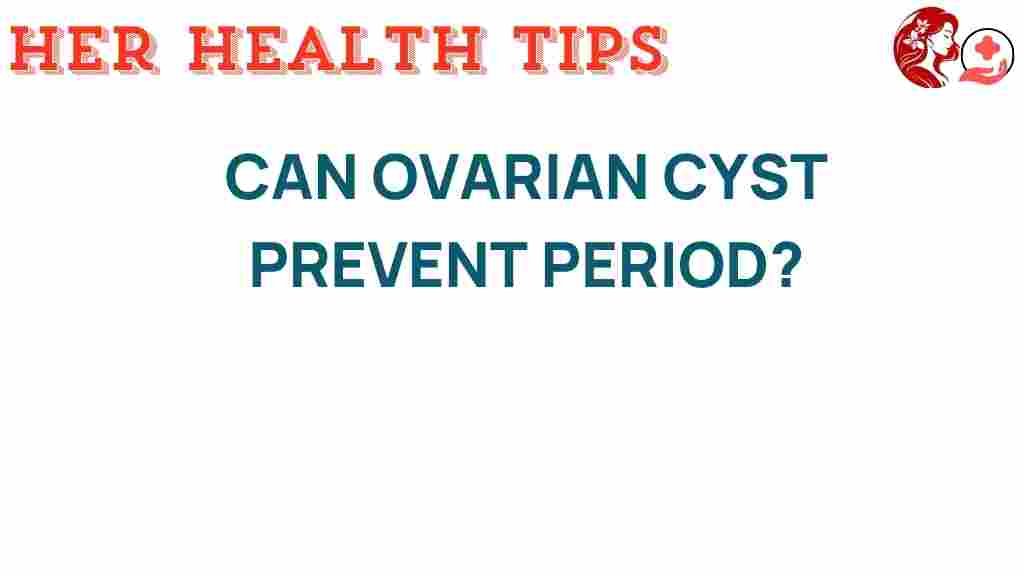Do Ovarian Cysts Hold the Key to Missed Periods?
Missed periods can be a source of anxiety for many women, often signaling potential issues within the reproductive system. One common cause of missed periods is the presence of ovarian cysts, which can disrupt the normal hormonal balance necessary for a regular menstrual cycle. Understanding the relationship between ovarian cysts and missed periods is essential for maintaining menstrual health and overall women’s health. In this article, we will delve into what ovarian cysts are, how they affect menstrual cycles, their symptoms, diagnosis, and various treatment options available.
Understanding Ovarian Cysts
Ovarian cysts are fluid-filled sacs that develop on the surface of an ovary. They are quite common and often form during the menstrual cycle. While many ovarian cysts are harmless and may resolve on their own, some can cause complications, including hormonal imbalances that lead to missed periods.
- Types of Ovarian Cysts:
- Functional Cysts: These are the most common type and include follicular cysts and corpus luteum cysts.
- Pathological Cysts: These are less common and may require medical intervention.
Functional cysts typically develop as part of the normal menstrual cycle. If they do not disappear or if they grow large, they can lead to symptoms such as pelvic pain or pressure.
The Connection Between Ovarian Cysts and Missed Periods
Ovarian cysts can disrupt the hormonal signals that regulate the menstrual cycle. Here’s how:
- Hormonal Imbalance: Ovarian cysts can cause an imbalance in hormones such as estrogen and progesterone, leading to missed periods.
- Impact on Ovulation: Some cysts can interfere with ovulation, which is crucial for a regular menstrual cycle.
- Stress on the Reproductive System: Larger cysts can cause discomfort or pain, potentially affecting overall health and leading to missed periods.
Understanding these connections is vital for women who experience irregular cycles and missed periods.
Symptoms of Ovarian Cysts
Many women with ovarian cysts may not experience any symptoms. However, when symptoms do occur, they can include:
- Pelvic pain or discomfort
- Irregular menstrual cycles
- Missed periods
- Heavy bleeding during periods
- Difficulty emptying the bladder
- Changes in bowel habits
If you experience any of these symptoms, particularly persistent pelvic pain or significant changes in your menstrual cycle, it’s essential to consult a healthcare provider.
Diagnosis of Ovarian Cysts
Diagnosing ovarian cysts typically involves a combination of a physical exam, a review of medical history, and imaging tests. Here are the common steps:
- Physical Examination: Your doctor may perform a pelvic exam to check for abnormalities.
- Ultrasound: This imaging test is often used to visualize the ovaries and any cysts present.
- Blood Tests: Hormonal levels may be evaluated to assess for imbalances.
These diagnostic methods help determine the type of cyst and whether it may be affecting your menstrual health.
Treatment Options for Ovarian Cysts
Treatment for ovarian cysts varies based on the type of cyst, symptoms, and the woman’s overall health. Options may include:
- Watchful Waiting: If the cyst is small and asymptomatic, your doctor may recommend monitoring it over time.
- Medications: Hormonal contraceptives can help regulate menstrual cycles and prevent the formation of new cysts.
- Surgery: In cases of large or persistent cysts that cause significant issues, surgical intervention may be necessary.
Always discuss with your healthcare provider to determine the best course of action based on your specific situation.
Step-by-Step Process to Address Missed Periods Due to Ovarian Cysts
If you suspect that ovarian cysts are causing your missed periods, follow these steps:
- Monitor Your Symptoms: Keep track of your menstrual cycle, noting any irregularities, pain, or other symptoms.
- Consult a Healthcare Provider: Schedule an appointment to discuss your symptoms and concerns.
- Undergo Diagnostic Tests: Follow through with recommended tests such as ultrasounds and blood tests.
- Discuss Treatment Options: Review the findings with your doctor and explore treatment options suitable for your situation.
- Maintain a Healthy Lifestyle: Adopting a balanced diet, exercising regularly, and managing stress can support hormonal balance.
Troubleshooting Tips for Managing Missed Periods
While dealing with missed periods, consider these troubleshooting tips:
- Track Your Cycle: Use a calendar or app to keep track of your menstrual cycle and any symptoms you experience.
- Manage Stress: High stress levels can impact your hormonal balance, so consider relaxation techniques such as yoga or meditation.
- Maintain a Healthy Diet: Eating a balanced diet rich in fruits, vegetables, whole grains, and lean proteins can help regulate hormones.
- Stay Hydrated: Adequate hydration supports overall health and can help manage symptoms.
- Seek Support: If you feel overwhelmed, consider discussing your feelings with a trusted friend or mental health professional.
Conclusion
Ovarian cysts can indeed hold the key to understanding missed periods, as they often disrupt the delicate hormonal balance necessary for regular menstrual cycles. By recognizing the symptoms, seeking proper diagnosis, and exploring treatment options, women can take charge of their menstrual health and address any reproductive system issues they may face. If you are experiencing irregularities in your cycle, do not hesitate to reach out to a healthcare provider for guidance and support.
For more information on women’s health issues, visit WomensHealth.gov. If you would like to learn more about managing your menstrual health, consider reading our other articles on this topic here.
This article is in the category Reproductive and created by HerHealthTips Team
